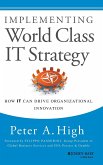Altering Frontiers
Organizational Innovations in Healthcare
Herausgegeben:Grenier, Corinne; Oiry, Ewan
Altering Frontiers
Organizational Innovations in Healthcare
Herausgegeben:Grenier, Corinne; Oiry, Ewan
- Gebundenes Buch
- Merkliste
- Auf die Merkliste
- Bewerten Bewerten
- Teilen
- Produkt teilen
- Produkterinnerung
- Produkterinnerung
How can healthcare systems be transformed by reimagining their multiple silos to favor processes and practices that are more responsive to local, horizontal initiatives? Altering Frontiers analyzes numerous experiences, using a multidisciplinary approach, paying attention to certain actors, collectives and organizational arrangements.
Through this work, levers are identified that promote lasting transformation: recognizing the legitimacy of the practices of many who are often "invisible"; trusting those who know their intervention territory; investing in methodological support; taking…mehr
Andere Kunden interessierten sich auch für
![The Digital Revolution in Health The Digital Revolution in Health]() The Digital Revolution in Health187,99 €
The Digital Revolution in Health187,99 €![Innovation Economics, Engineering and Management Handbook 2 Innovation Economics, Engineering and Management Handbook 2]() Innovation Economics, Engineering and Management Handbook 2187,99 €
Innovation Economics, Engineering and Management Handbook 2187,99 €![Innovation Economics, Engineering and Management Handbook 1 Innovation Economics, Engineering and Management Handbook 1]() Innovation Economics, Engineering and Management Handbook 1186,99 €
Innovation Economics, Engineering and Management Handbook 1186,99 €![Liberalism and Capitalism Today Liberalism and Capitalism Today]() Paul-Jacques LehmannLiberalism and Capitalism Today186,99 €
Paul-Jacques LehmannLiberalism and Capitalism Today186,99 €![Immersive Technologies to Accelerate Innovation Immersive Technologies to Accelerate Innovation]() Sylvain FleuryImmersive Technologies to Accelerate Innovation187,99 €
Sylvain FleuryImmersive Technologies to Accelerate Innovation187,99 €![Implementing World Class It Strategy Implementing World Class It Strategy]() Peter A. HighImplementing World Class It Strategy50,99 €
Peter A. HighImplementing World Class It Strategy50,99 €![The Contributory Revolution The Contributory Revolution]() Pierre GiorginiThe Contributory Revolution187,99 €
Pierre GiorginiThe Contributory Revolution187,99 €-
-
-
How can healthcare systems be transformed by reimagining their multiple silos to favor processes and practices that are more responsive to local, horizontal initiatives? Altering Frontiers analyzes numerous experiences, using a multidisciplinary approach, paying attention to certain actors, collectives and organizational arrangements.
Through this work, levers are identified that promote lasting transformation: recognizing the legitimacy of the practices of many who are often "invisible"; trusting those who know their intervention territory; investing in methodological support; taking advantage of tools and procedures such as instruments for strategic and managerial discussion; and developing the capacity to absorb innovative ideas and experiences that circulate within the environment.
Hinweis: Dieser Artikel kann nur an eine deutsche Lieferadresse ausgeliefert werden.
Through this work, levers are identified that promote lasting transformation: recognizing the legitimacy of the practices of many who are often "invisible"; trusting those who know their intervention territory; investing in methodological support; taking advantage of tools and procedures such as instruments for strategic and managerial discussion; and developing the capacity to absorb innovative ideas and experiences that circulate within the environment.
Hinweis: Dieser Artikel kann nur an eine deutsche Lieferadresse ausgeliefert werden.
Produktdetails
- Produktdetails
- Verlag: Wiley & Sons / Wiley-ISTE
- Artikelnr. des Verlages: 1W786307070
- 1. Auflage
- Seitenzahl: 256
- Erscheinungstermin: 21. Juli 2021
- Englisch
- Abmessung: 240mm x 161mm x 18mm
- Gewicht: 520g
- ISBN-13: 9781786307071
- ISBN-10: 1786307073
- Artikelnr.: 62032319
- Herstellerkennzeichnung
- Libri GmbH
- Europaallee 1
- 36244 Bad Hersfeld
- gpsr@libri.de
- Verlag: Wiley & Sons / Wiley-ISTE
- Artikelnr. des Verlages: 1W786307070
- 1. Auflage
- Seitenzahl: 256
- Erscheinungstermin: 21. Juli 2021
- Englisch
- Abmessung: 240mm x 161mm x 18mm
- Gewicht: 520g
- ISBN-13: 9781786307071
- ISBN-10: 1786307073
- Artikelnr.: 62032319
- Herstellerkennzeichnung
- Libri GmbH
- Europaallee 1
- 36244 Bad Hersfeld
- gpsr@libri.de
Corinne Grenier is Professor of Strategy and Innovation at KEDGE Business School, France, and is the director of the Center of Expertise Health & Innovation. She is also the scientific director of the MSAIS (Mastere Specialise Management des Structures et Activites Innovantes en Sante) program. Ewan Oiry is Full Professor in HRM at Ecole des Sciences de Gestion - Universite du Québec a Montreal (ESG-UQAM), Canada. His research focuses on competence management. He is co-lead of the AGRH Thematic Research Group "Competency Management - Didier Retour".
Foreword by Jean-Louis Denis: Adaptation, Trust and Methodology xi
Jean-Louis DENIS
Foreword by Norbert Nabet : The Challenges of Altering Frontiers: For Other More Collaborative Approaches xvii
Norbert NABET
Introduction: The Challenges of "Altering Frontiers": The Multiple Facets of Boundaries to Cross and Articulate xxi
Corinne GRENIER and Ewan OIRY
Part 1. Innovations as Seen by Stakeholders 1
Introduction to Part 1 3
Chapter 1. Recognition of Patients' Experiential Knowledge and Co-production of Care Knowledge with Patients and Citizens in the 21st Century 7
Luigi FLORA
1.1. Introduction 7
1.2. From "empowerment" to the "patient revolution", an international trend 8
1.3. From paternalism to different forms of participation and partnership with patients 14
1.4. Innovative practices 14
1.5. Conclusion 25
1.6. References 26
Chapter 2. Innovative Organizations and Professional Strategies: The Nursing Professional Space 29
Philippe MOSSÉ
2.1. Introduction: experimenting experimentation 29
2.2. Participatory evidence-based policy: a new conceptual framework? 31
2.3. Article 51: a full-scale test 34
2.3.1. Experimenting for recognition 34
2.3.2. An expression of interest 36
2.4. The nursing space: a controlled extension 38
2.4.1. Asalée: a fragile experiment 39
2.4.2. The nurse in advanced practice: spearhead or first in line 41
2.5. Conclusion: new ways of doing things 46
2.6. Appendix: examples of emancipatory innovations in the 1990s 47
2.6.1. Nursing specialization versus the place of the manager 47
2.6.2. Stubborn labor relations 48
2.7. References 48
Chapter 3. Managed Communities of Practice in the Gerontology Sector: Case of a CoP of Gerontology Volunteers in Sweden 51
Bertrand PAUGET
3.1. Introduction 51
3.2. Context and questions 52
3.3. Conceptual framework 53
3.3.1. Volunteering 53
3.3.2. Communities of practice 53
3.3.3. Managed communities of practice 54
3.3.4. The interpretative framework of a piloted community of practice 55
3.4. Illustrations 55
3.4.1. The Swedish context 55
3.4.2. A community of practice piloted in the field of gerontology 56
3.5. Conclusion 58
3.6. References 59
Part 2. Innovations on the Collective Side 61
Introduction to Part 2 63
Chapter 4. Moving from Partitioning to Transversality in Operating Rooms using Robot-assisted Surgery 67
Delphine WANNENMACHER
4.1. Introduction 67
4.2. The context of operating rooms mobilizing the surgical robot 68
4.3. The issue of technical and non-technical skills in the context of robotic surgery 69
4.4. The effects of new technologies in terms of individual and collective skills 70
4.5. Viewing at the heart of robot-assisted surgery in urology 71
4.5.1. A pragmatic approach to analyzing the activity of an operating theater 71
4.5.2. A configuration of the operating room and an installation of the patient constrained by the surgical robot 72
4.5.3. A spatiotemporal separation and limited communication between team members 74
4.5.4. The impoverishment and disarticulation of individual and collective skills in the operating room, mobilizing the surgical robot 75
4.6. Discussion 77
4.7. References 79
Chapter 5. Clinical Poles of Activity, an Opportunity for New Cooperation Between the Actors? The Case of a Hospital 81
Christelle HAVARD
5.1. Key eleme
Jean-Louis DENIS
Foreword by Norbert Nabet : The Challenges of Altering Frontiers: For Other More Collaborative Approaches xvii
Norbert NABET
Introduction: The Challenges of "Altering Frontiers": The Multiple Facets of Boundaries to Cross and Articulate xxi
Corinne GRENIER and Ewan OIRY
Part 1. Innovations as Seen by Stakeholders 1
Introduction to Part 1 3
Chapter 1. Recognition of Patients' Experiential Knowledge and Co-production of Care Knowledge with Patients and Citizens in the 21st Century 7
Luigi FLORA
1.1. Introduction 7
1.2. From "empowerment" to the "patient revolution", an international trend 8
1.3. From paternalism to different forms of participation and partnership with patients 14
1.4. Innovative practices 14
1.5. Conclusion 25
1.6. References 26
Chapter 2. Innovative Organizations and Professional Strategies: The Nursing Professional Space 29
Philippe MOSSÉ
2.1. Introduction: experimenting experimentation 29
2.2. Participatory evidence-based policy: a new conceptual framework? 31
2.3. Article 51: a full-scale test 34
2.3.1. Experimenting for recognition 34
2.3.2. An expression of interest 36
2.4. The nursing space: a controlled extension 38
2.4.1. Asalée: a fragile experiment 39
2.4.2. The nurse in advanced practice: spearhead or first in line 41
2.5. Conclusion: new ways of doing things 46
2.6. Appendix: examples of emancipatory innovations in the 1990s 47
2.6.1. Nursing specialization versus the place of the manager 47
2.6.2. Stubborn labor relations 48
2.7. References 48
Chapter 3. Managed Communities of Practice in the Gerontology Sector: Case of a CoP of Gerontology Volunteers in Sweden 51
Bertrand PAUGET
3.1. Introduction 51
3.2. Context and questions 52
3.3. Conceptual framework 53
3.3.1. Volunteering 53
3.3.2. Communities of practice 53
3.3.3. Managed communities of practice 54
3.3.4. The interpretative framework of a piloted community of practice 55
3.4. Illustrations 55
3.4.1. The Swedish context 55
3.4.2. A community of practice piloted in the field of gerontology 56
3.5. Conclusion 58
3.6. References 59
Part 2. Innovations on the Collective Side 61
Introduction to Part 2 63
Chapter 4. Moving from Partitioning to Transversality in Operating Rooms using Robot-assisted Surgery 67
Delphine WANNENMACHER
4.1. Introduction 67
4.2. The context of operating rooms mobilizing the surgical robot 68
4.3. The issue of technical and non-technical skills in the context of robotic surgery 69
4.4. The effects of new technologies in terms of individual and collective skills 70
4.5. Viewing at the heart of robot-assisted surgery in urology 71
4.5.1. A pragmatic approach to analyzing the activity of an operating theater 71
4.5.2. A configuration of the operating room and an installation of the patient constrained by the surgical robot 72
4.5.3. A spatiotemporal separation and limited communication between team members 74
4.5.4. The impoverishment and disarticulation of individual and collective skills in the operating room, mobilizing the surgical robot 75
4.6. Discussion 77
4.7. References 79
Chapter 5. Clinical Poles of Activity, an Opportunity for New Cooperation Between the Actors? The Case of a Hospital 81
Christelle HAVARD
5.1. Key eleme
Foreword by Jean-Louis Denis: Adaptation, Trust and Methodology xi
Jean-Louis DENIS
Foreword by Norbert Nabet : The Challenges of Altering Frontiers: For Other More Collaborative Approaches xvii
Norbert NABET
Introduction: The Challenges of "Altering Frontiers": The Multiple Facets of Boundaries to Cross and Articulate xxi
Corinne GRENIER and Ewan OIRY
Part 1. Innovations as Seen by Stakeholders 1
Introduction to Part 1 3
Chapter 1. Recognition of Patients' Experiential Knowledge and Co-production of Care Knowledge with Patients and Citizens in the 21st Century 7
Luigi FLORA
1.1. Introduction 7
1.2. From "empowerment" to the "patient revolution", an international trend 8
1.3. From paternalism to different forms of participation and partnership with patients 14
1.4. Innovative practices 14
1.5. Conclusion 25
1.6. References 26
Chapter 2. Innovative Organizations and Professional Strategies: The Nursing Professional Space 29
Philippe MOSSÉ
2.1. Introduction: experimenting experimentation 29
2.2. Participatory evidence-based policy: a new conceptual framework? 31
2.3. Article 51: a full-scale test 34
2.3.1. Experimenting for recognition 34
2.3.2. An expression of interest 36
2.4. The nursing space: a controlled extension 38
2.4.1. Asalée: a fragile experiment 39
2.4.2. The nurse in advanced practice: spearhead or first in line 41
2.5. Conclusion: new ways of doing things 46
2.6. Appendix: examples of emancipatory innovations in the 1990s 47
2.6.1. Nursing specialization versus the place of the manager 47
2.6.2. Stubborn labor relations 48
2.7. References 48
Chapter 3. Managed Communities of Practice in the Gerontology Sector: Case of a CoP of Gerontology Volunteers in Sweden 51
Bertrand PAUGET
3.1. Introduction 51
3.2. Context and questions 52
3.3. Conceptual framework 53
3.3.1. Volunteering 53
3.3.2. Communities of practice 53
3.3.3. Managed communities of practice 54
3.3.4. The interpretative framework of a piloted community of practice 55
3.4. Illustrations 55
3.4.1. The Swedish context 55
3.4.2. A community of practice piloted in the field of gerontology 56
3.5. Conclusion 58
3.6. References 59
Part 2. Innovations on the Collective Side 61
Introduction to Part 2 63
Chapter 4. Moving from Partitioning to Transversality in Operating Rooms using Robot-assisted Surgery 67
Delphine WANNENMACHER
4.1. Introduction 67
4.2. The context of operating rooms mobilizing the surgical robot 68
4.3. The issue of technical and non-technical skills in the context of robotic surgery 69
4.4. The effects of new technologies in terms of individual and collective skills 70
4.5. Viewing at the heart of robot-assisted surgery in urology 71
4.5.1. A pragmatic approach to analyzing the activity of an operating theater 71
4.5.2. A configuration of the operating room and an installation of the patient constrained by the surgical robot 72
4.5.3. A spatiotemporal separation and limited communication between team members 74
4.5.4. The impoverishment and disarticulation of individual and collective skills in the operating room, mobilizing the surgical robot 75
4.6. Discussion 77
4.7. References 79
Chapter 5. Clinical Poles of Activity, an Opportunity for New Cooperation Between the Actors? The Case of a Hospital 81
Christelle HAVARD
5.1. Key eleme
Jean-Louis DENIS
Foreword by Norbert Nabet : The Challenges of Altering Frontiers: For Other More Collaborative Approaches xvii
Norbert NABET
Introduction: The Challenges of "Altering Frontiers": The Multiple Facets of Boundaries to Cross and Articulate xxi
Corinne GRENIER and Ewan OIRY
Part 1. Innovations as Seen by Stakeholders 1
Introduction to Part 1 3
Chapter 1. Recognition of Patients' Experiential Knowledge and Co-production of Care Knowledge with Patients and Citizens in the 21st Century 7
Luigi FLORA
1.1. Introduction 7
1.2. From "empowerment" to the "patient revolution", an international trend 8
1.3. From paternalism to different forms of participation and partnership with patients 14
1.4. Innovative practices 14
1.5. Conclusion 25
1.6. References 26
Chapter 2. Innovative Organizations and Professional Strategies: The Nursing Professional Space 29
Philippe MOSSÉ
2.1. Introduction: experimenting experimentation 29
2.2. Participatory evidence-based policy: a new conceptual framework? 31
2.3. Article 51: a full-scale test 34
2.3.1. Experimenting for recognition 34
2.3.2. An expression of interest 36
2.4. The nursing space: a controlled extension 38
2.4.1. Asalée: a fragile experiment 39
2.4.2. The nurse in advanced practice: spearhead or first in line 41
2.5. Conclusion: new ways of doing things 46
2.6. Appendix: examples of emancipatory innovations in the 1990s 47
2.6.1. Nursing specialization versus the place of the manager 47
2.6.2. Stubborn labor relations 48
2.7. References 48
Chapter 3. Managed Communities of Practice in the Gerontology Sector: Case of a CoP of Gerontology Volunteers in Sweden 51
Bertrand PAUGET
3.1. Introduction 51
3.2. Context and questions 52
3.3. Conceptual framework 53
3.3.1. Volunteering 53
3.3.2. Communities of practice 53
3.3.3. Managed communities of practice 54
3.3.4. The interpretative framework of a piloted community of practice 55
3.4. Illustrations 55
3.4.1. The Swedish context 55
3.4.2. A community of practice piloted in the field of gerontology 56
3.5. Conclusion 58
3.6. References 59
Part 2. Innovations on the Collective Side 61
Introduction to Part 2 63
Chapter 4. Moving from Partitioning to Transversality in Operating Rooms using Robot-assisted Surgery 67
Delphine WANNENMACHER
4.1. Introduction 67
4.2. The context of operating rooms mobilizing the surgical robot 68
4.3. The issue of technical and non-technical skills in the context of robotic surgery 69
4.4. The effects of new technologies in terms of individual and collective skills 70
4.5. Viewing at the heart of robot-assisted surgery in urology 71
4.5.1. A pragmatic approach to analyzing the activity of an operating theater 71
4.5.2. A configuration of the operating room and an installation of the patient constrained by the surgical robot 72
4.5.3. A spatiotemporal separation and limited communication between team members 74
4.5.4. The impoverishment and disarticulation of individual and collective skills in the operating room, mobilizing the surgical robot 75
4.6. Discussion 77
4.7. References 79
Chapter 5. Clinical Poles of Activity, an Opportunity for New Cooperation Between the Actors? The Case of a Hospital 81
Christelle HAVARD
5.1. Key eleme








